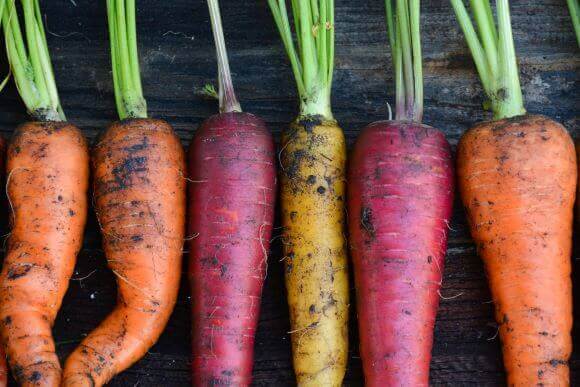
If you grow carrots, you’ve likely experienced the joy of pulling a fresh carrot from the soil, anticipating that perfect blend of sweetness and earthy flavor. But what if your homegrown carrots taste bitter instead of sweet? If you’ve found yourself wondering, “Why are my carrots bitter?” you’re not alone. To understand why this happens, let’s first delve into the fascinating science behind carrot sweetness.
Carrots are nature’s candy factories, accumulating sugars as they mature. These sugars, primarily sucrose and glucose, are responsible for the delightful sweetness we associate with a perfect carrot. The process of sugar accumulation is a complex dance of factors, each playing a crucial role in determining the final flavor profile of your carrots.
Variety: The Sweet Gene Pool
Did you know that not all carrots are created equal when it comes to sweetness? Some carrot varieties are inherently sweeter than others, thanks to their genetic makeup. For instance, varieties like ‘Sugarsnax’, ‘Sweetness II’, and ‘Candysnax’ are renowned for their high sugar content. These carrots have been selectively bred to enhance their natural sweetness, making them a favorite among gardeners with a sweet tooth.
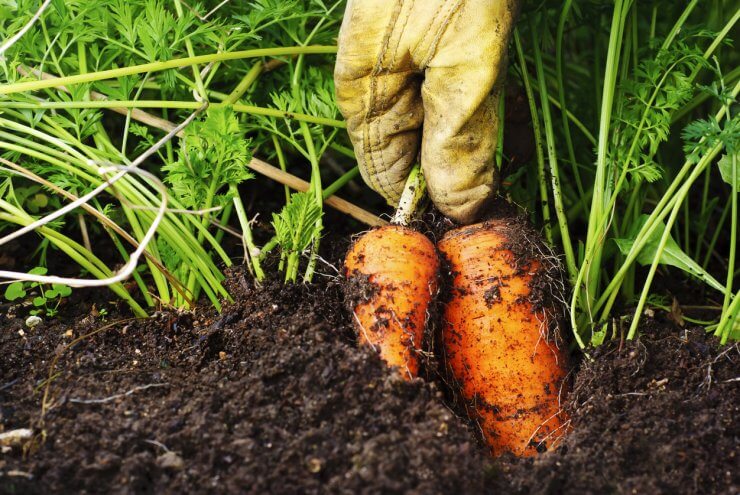
Soil Conditions: The Foundation of Flavor
Carrots are like gourmets of the plant world – they have specific preferences when it comes to their growing environment. These root vegetables thrive in well-drained, sandy-loam soil rich in organic matter. Such conditions promote healthy root growth and optimal sugar accumulation.
Here’s a nerdy tidbit: the texture of your soil directly impacts the shape and sweetness of your carrots. In loose, sandy soil, carrots can grow long and straight, allowing for more efficient sugar distribution throughout the root. In contrast, heavy clay soil can lead to stunted, misshapen carrots with potentially bitter flavors.
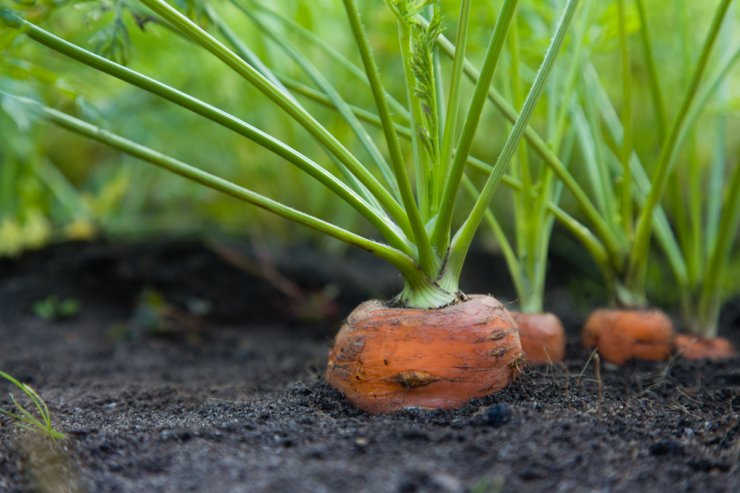
Climate: The Sugar Factory’s Thermostat
Adequate sunlight and moderate temperatures are the ideal working conditions for a carrot’s internal sugar factory. Carrots prefer cool temperatures, typically between 60°F and 70°F (15°C to 21°C). In these conditions, the plants can focus their energy on root development and sugar production rather than struggling to survive extreme heat or cold.
Interestingly, a bit of cold stress can actually increase sweetness in carrots. When temperatures drop close to freezing, carrots convert some of their starches into sugars as a natural antifreeze mechanism. This is why many gardeners swear by leaving their carrots in the ground until after the first frost for an extra sweet harvest. In fact, if you were to ask a friend why your carrots are bitter, they’re likely to tell you that you pulled them too early! But of course, now you’ll know that’s not the only reason!
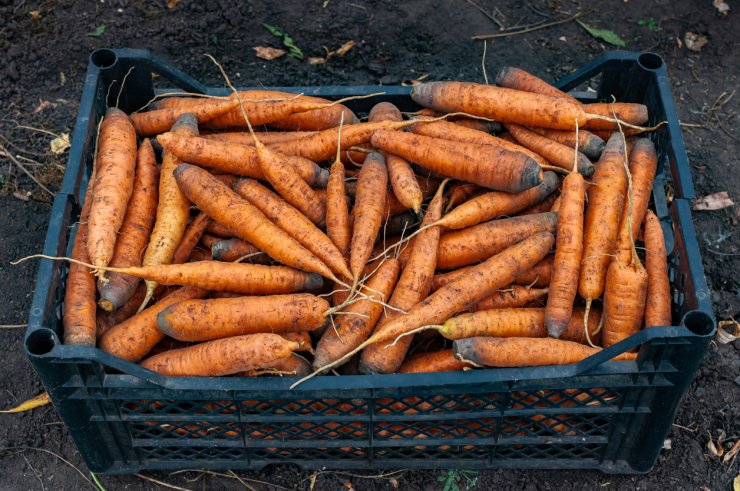
Harvest Time: The Sweet Spot
Timing is everything when it comes to harvesting sweet carrots. Harvesting carrots at the right maturity is crucial for optimal sweetness. Underripe carrots may be less sweet and more bitter, as they haven’t had enough time to accumulate sugars.
But how do you know when your carrots are ready? Generally, carrots are ready to harvest about 60-80 days after planting, depending on the variety. Look for the top of the carrot root (called the “shoulder”) to be about 3/4 to 1 inch in diameter. You can also gently brush away some soil to check the size of the root.
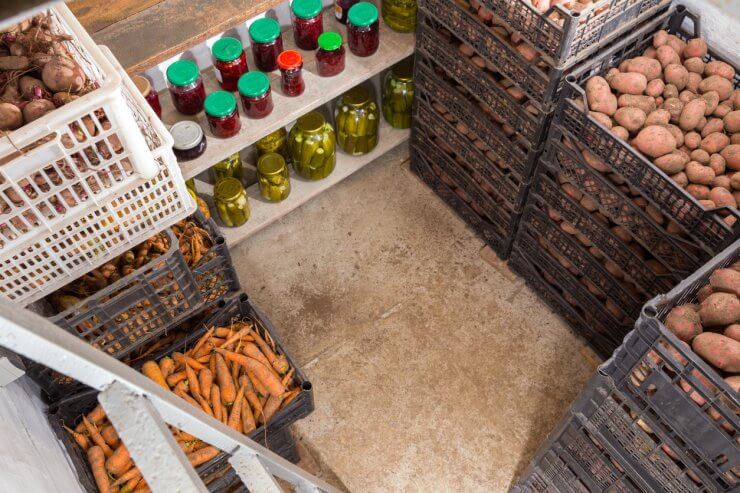
Storage: Preserving the Sweetness
Even after harvest, the sweetness saga continues. Proper storage can preserve and even enhance the sweetness of your carrots. Store your carrots in a cool, dark place with high humidity. The ideal temperature is just above freezing, around 32°F to 40°F (0°C to 4°C).
Here’s a fun fact: carrots can actually become sweeter after harvest if stored properly. This is because they continue to convert starches into sugars even after being pulled from the ground. Some gardeners store their carrots in damp sand in a cool cellar to maintain optimal sweetness for months.
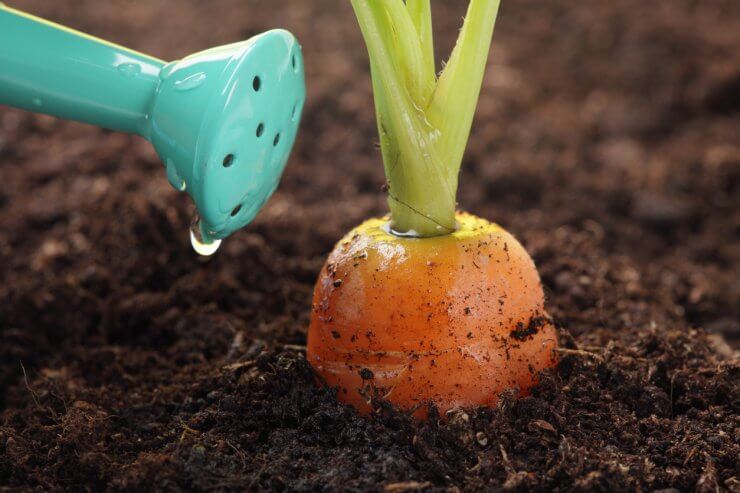
Possible Reasons for Bitter Carrots
Now that we understand what makes carrots sweet, let’s explore the question, “Why are my carrots bitter?” If you’ve experienced bitter carrots, it’s likely due to one or more of the following factors:
Harvesting Too Early
As mentioned earlier, carrots develop sweetness as they mature. Harvesting prematurely can result in a bitter taste. The carrot hasn’t had enough time to accumulate sugars, leaving you with a less-than-satisfactory flavor profile.
Stressful Growing Conditions
Just like humans, plants can get stressed out. For carrots, stressors like drought, excessive heat, or nutrient deficiencies can impact their flavor. When carrots are stressed, they may produce more terpenoids – compounds that can contribute to a bitter taste. These compounds are actually part of the plant’s defense mechanism against pests and diseases.
Variety
Some carrot varieties are naturally more prone to bitterness. Wild carrots, for instance, tend to be more bitter than their cultivated cousins. This bitterness was an evolutionary advantage, deterring animals from eating the roots and allowing the plants to reproduce.
Soil Conditions
Heavy clay soil or poor drainage can lead to bitter carrots. In these conditions, carrots struggle to grow properly, often resulting in forked or stunted roots. This stress can trigger the production of bitter compounds.
Additionally, soil that’s too rich in nitrogen can cause carrots to focus on growing lush, green tops at the expense of sweet roots. This is why it’s often recommended to avoid fertilizing carrots with nitrogen-rich fertilizers.
Pests and Diseases
Infestations and diseases can affect carrot taste. For example, carrot rust flies can cause damage that leads to bitter flavors. Similarly, fungal diseases can stress the plant, potentially altering its flavor profile.
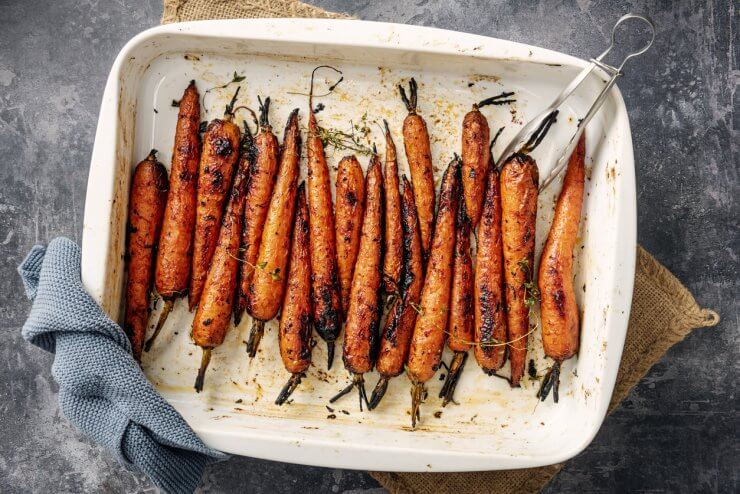
Tips for Growing Sweeter Carrots
Armed with this knowledge, you’re now ready to grow the sweetest carrots in your garden. Here are some expert tips to ensure your next carrot harvest is deliciously sweet and you’re not left asking, “Why are my carrots bitter?”:
- Choose Sweet Varieties: Opt for carrot varieties known for their sweetness. Some popular sweet varieties include ‘Nantes’, ‘Imperator’, and ‘Chantenay’. These varieties have been bred for their sugar content and are less likely to develop bitter flavors.
- Prepare Your Soil: Ensure your soil is well-drained and rich in organic matter. If you have heavy clay soil, consider creating raised beds or amending your soil with sand and compost to improve drainage and texture.
- Time Your Planting: Plant carrots at the appropriate time for your climate. In most regions, you can plant carrots in early spring for a summer harvest, or in late summer for a fall crop. Avoid planting during the hottest parts of summer, as extreme heat can stress the plants.
- Provide Adequate Water: Consistent moisture is essential for sweet carrots, but avoid overwatering. Aim for about 1 inch of water per week, either from rainfall or irrigation. Using mulch can help retain soil moisture and prevent rapid drying.
- Protect from Pests and Diseases: Take steps to prevent damage to your carrot plants. Use floating row covers to protect against carrot rust flies, practice crop rotation to prevent soil-borne diseases, and keep your garden clean to reduce pest habitats.
- Harvest at the Right Time: Allow carrots to mature fully before harvesting. If you’re unsure, it’s better to wait a little longer rather than harvesting too early. You can even do a “taste test” by pulling one carrot and trying it before harvesting the entire crop.
By following these tips and understanding the science behind carrot sweetness, you’re well on your way to growing the sweetest, most delicious carrots in your garden. Remember, gardening is a journey of continuous learning and experimentation. Don’t be discouraged if your first attempts aren’t perfect – each season brings new opportunities to refine your techniques and grow even better carrots.
Want to dive deeper into the world of carrot cultivation? Check out our comprehensive Carrots Gardening Guide for more expert tips and tricks!
We’d love to hear about your carrot-growing experiences. Have you battled bitter carrots? Discovered a secret to sweetness? Share your stories and questions in the comments below!


 Previous
Previous

